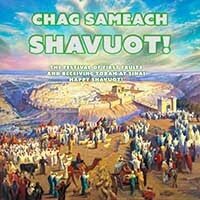“May HaShem bless you and watch over you”
(Numbers 6:24)
Sivan 4, 5782/June 3, 2022
In this week's Torah reading, Naso, the Torah dedicates six succinct verses to what is perhaps the most enduring and endearing of ceremonies which took place in the Holy Temple:
"HaShem spoke to Moshe saying: Speak to Aharon and his sons, saying: This is how you shall bless the children of Israel, saying to them: 'May HaShem bless you and watch over you. May HaShem cause His countenance to shine to you and favor you. May HaShem raise His countenance toward you and grant you peace.' They shall bestow My Name upon the children of Israel, so that I will bless them."(Numbers 6:22-27)
Known as birkat kohanim - the priestly blessing - this tri-part benediction, which was first uttered by Aharon, the Kohen Gadol(High Priest) at the inauguration of the Tabernacle in the wilderness, continues to be uttered by Aharon's descendants, today's kohanim, each day of the week in synagogues, twice on holidays, three times on Yom Kippur, and every Friday evening, by fathers to their sons and daughters, just before making Kiddush and sanctifying the Shabbat.
In the Song of Songs, which is a love song between HaShem and Israel, we read the following: "Behold the bed of Solomon; sixty mighty men are around it, of the mighty men of Israel. They all hold the sword, skilled in warfare; each one with his sword on his thigh because of fear at night." (Song of Songs 3:7-8) Who are these "sixty mighty men" who surround King Solomon's bed and guard over him? Our sages teach us that these sixty mighty men are none other than the sixty Hebrew letters which make us the priestly blessing! It is the power of this timeless blessing which not only guards over King Solomon, but guards over all of us. This is why observant Jews say the blessing just before going to sleep at night, and just after waking in the morning.
HaShem tells Moshe, "They shall bestow My Name upon the children of Israel, so that I will bless them." The kohanim, by raising their hands, holding them together, spreading their fingers into a certain configuration and reciting the words of the blessing are acting as conduits, transferring, on HaShem's behalf, His blessing to Israel. Thus we learn that the power of a blessing is not just that it comes from G-d, but that we, G-d's children, play an active role in making a blessing real. When we bless someone we are opening ourselves up to receive Divine inspiration from HaShem, and are assuming the responsibility for bestowing the blessing upon the recipient. It is truly a win-win, bless and be blessed situation.
When we bless someone we are literally bestowing a gift upon the receiver of our blessing. Every day Jews make hundreds of blessing over all sorts of things. We make a blessing when putting on a tallit or tefillin. But we also make a blessing before having a drink of water, indulging in an apple, or witnessing lightning or thunder. "Blessed are You HaShem, our G-d, Sovereign of the universe..." we say. But if making a blessing is an act of transferring a goodness to another, how is it that we can bless HaShem? What good can we possibly impart upon the infinite eternal reality of HaShem? When we open our blessing with “Blessed are You HaShem, our G-d, Sovereign of the universe..." we are bestowing G-d with an opportunity to bestow a goodness upon us! We are inviting HaShem into our world, even into what might seem like the trivial minutiae of our daily activities. But this is precisely where G-d wants to be! In everything that we do, in all that we are!
Making a blessing isn't just a quaint or antiquated custom of yesteryear. Making a blessing empowers us to be engaged with G-d, and to confer our commitment to HaShem upon others. Making a blessing makes new our world every time we say the words. Making a blessing makes us new, as we open ourselves up to allow the Divine energy of the blessing to pass through our being. But don't take my word for it. Bless someone, some thing, or bless G-d today, and see for yourself!
This Saturday evening, immediately following the conclusion of Shabbat, we celebrate the holiday of Shavuot, the holiday of receiving Torah, of bringing our first fruits to the Holy Temple and of the twin-loaf offering. On behalf of the Temple Institute I am extending our blessings for a happy, peaceful and inspirational Shavuot for all. Chag Shavuot Sameach - have a happy Shavuot!
* * * *
Haftarah For Shabbat Parashat Naso Judges 13:2-25: "And there was one man from Tzorah, from the family of the Danites, whose name was Manoach; and his wife was barren, and had not borne. And an angel of HaShem appeared to the woman, and said to her, 'Behold now, you are barren, and have not borne; and you shall conceive and bear a son..."

No comments:
Post a Comment